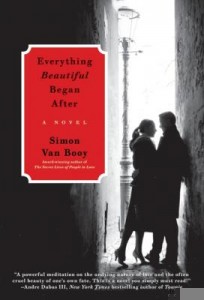[Harper Perennial; 2011]
by Sam Krowchenko
I experienced déjà vu from Simon Van Booy’s debut novel Everything Beautiful Began After when I reached its prologue’s final lines:
On the walk back home through the dusk, she’s going to ask her father for the story of how he met her mother.
All she knows is that someone fell, and that everything beautiful began after.
Authors often lift titles from lines in their texts, but usually the writer waits until after completing the more essential tasks of earning a reader’s interest in character and story before shuffling him/her toward that moment of satisfying thematic significance (think The Catcher in the Rye). But when that intended a-ha! moment rears its head 7 pages into a 402-page book, it bypasses establishing the story’s foundation and aims for immediate profundity, declaring its thematic intentions without allowing a reader to discover them him/herself. Great novelists hand readers the keys and ride shotgun, pointing out turns and exits whenever necessary, but never spoiling the destination. Van Booy is a backseat driver.
For the most part, he guides readers on a journey they’ve taken before. The players in Van Booy’s central love triangle converge on Athens, Greece, all seeking respite from their isolating lives. Former Air France flight attendant Rebecca flees to the city to pursue painting. One day in the park she befriends George, a shy, bowtied translator of ancient Greek who charms Rebecca into bed before alienating her with his alcoholism. Later, Rebecca and George fall for archaeologist Henry (the former romantically, the latter fraternally) through a series of separate, overly coincidental circumstances: she after a meeting at a bookstand leads to a day spent surveying ruins and sneaking into bed; he after a car accident (Henry drives into a drunken George) leads to their connecting over a mutual love of classics. The three form a strong, unlikely bond that, as the book jacket suggests, “will forever define them in the decades to come.”
Rarely does a novel simultaneously feel too fast and too slow, but Everything Beautiful Began After never settles on a steady pace; rather, the story accordions between curt, condensed chapters and prolonged passages, often oversimplifying scenes of which I wanted more and extending those of which I wanted less. Van Booy mismatches content and form – he combines a compressed timeline (Rebecca’s spends her first night with Henry one day after first making love to George) and page count (in eight pages Vany Booy collapses the two months in which George and Rebecca first become acquainted) with a detached prose style that leans too heavily on abstract and compact language.
Saying precisely what you mean in as few words as possible is the foundation of great writing, but Van Booy is overly economical, summarizing intimacy rather than permitting us entry. “[He] set down his glass gently and admitted that he felt very close to her,” Van Booy writes of Henry’s love for Rebecca, “closer than he had ever felt to anyone.” And earlier, also of Henry: “He wanted to love her, and almost could – but something restrained him. He’d felt it all his life, like arms holding him back from the happiness that would destroy him.” By abbreviating the emotional heft of his story into tiny morsels, Van Booy softens the overall blow of the love story by intermittently placing such heavy emphasis on it while otherwise underemphasizing it.
I suspect Van Booy was aware of this imbalance, because the turn Everything Beautiful Began After takes at its halfway mark completely inverses the problems in its first portion. After a tragic twist, the story shifts from third to second-person as told from a grieving Henry’s perspective, and the detachment that dominated the book’s tone transforms alongside the POV into melodrama, leaning on irritatingly abstract language: “You were the Oedipus of legend, the doomed soul, left to wander blindly in the wilderness.” Or, referring to a deceased woman: “Her life would wear the mask of paradise.” Whereas emotion and intimacy initially appeared in short supply, now they arrive in overabundance. If Van Booy explores love at too great a distance, he investigates grief with barely any breathing room, loading the page with empty lyricism that makes our disconnect all the more frustrating. At times this works to great effect (the redundancy and obsessive quality of Henry’s thoughts ring true), but more often than not it strikes one note over and over, never hitting it in a convincing way.
Which is a shame, because moments in Everything Beautiful Began After strike the balance between resonant emotion and economical prose with expert precision:
“The Quiet Story of a Sleeping Man” was the title of a sketch Rebecca had made of her grandfather one afternoon. When she showed it to him, he nodded and patted her head gently. Then he went into the bathroom and closed the door. The hollow clank of his belt hit the floor. Then a long sigh. A newspaper rustling.
While Van Booy overstays his welcome in the grief department, he understands that sex scenes need only a few suggestive details to effectively entice: “They were soon in bed. She could feel his muscles tightening over her, and she opened her thighs to take in as much as possible. Afterward, they lay on their backs.”
“It’s like so much here,” George notes of an Italian brass band, “unsophisticated but sincere.” Everything Beautiful Began After aims for sophisticated sincerity, but doesn’t finds the middle ground between its narrative and linguistic aspirations –it’s either emotionally evasive or gallingly grandiose. I hope, though, that Van Booy heeds the advice of his own title – perhaps, with this first novelistic effort behind him, he’ll reach something beautiful beyond.
This post may contain affiliate links.









